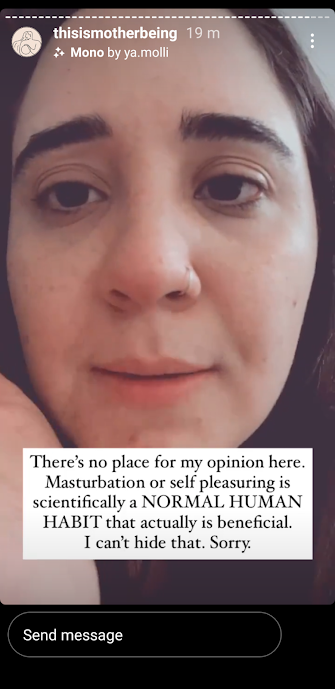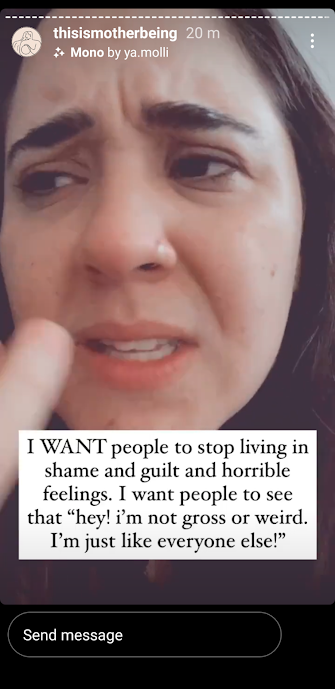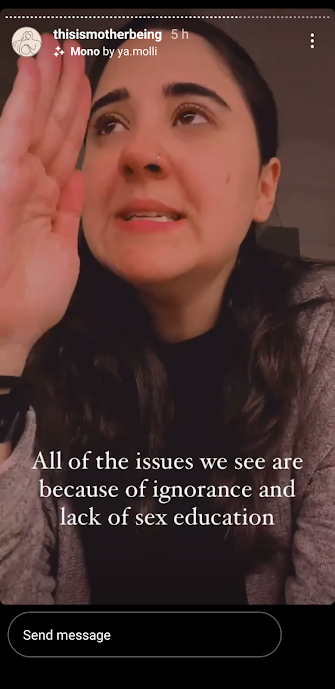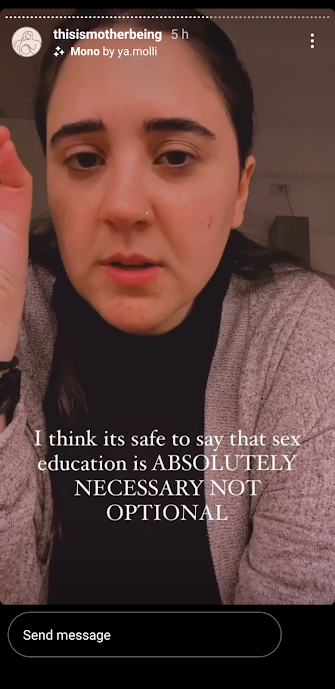Article by Fatima Kried
Artwork by Mloukhiyyé
This article is part of the “Hopefully Tomorrow” issue
Though many Arabs with marginalized identities feel ostracized and pushed aside from everyday life, there is a revolution of sorts brewing online. In even the most troubling of times, pockets of representation have surfaced across platforms like Instagram and TikTok, covering many topics deemed 3aib across the Arab region. Is this the start of a new era in the Arab world?
One major shift can be seen in recent online coverage and reactions to stories of women who were sexually harassed or murdered across Egypt, Lebanon, and Turkey. The collective mourning of the lives harmed and lost due to a patriarchal society and toxic masculinity found a productive outlet online, where their anger was felt globally. Within months, pages upon pages were created to call out abusers across the region, some garnering a following of hundreds of thousands. Though legal repercussions have not yet been realized for every situation, these pages effectively reflect the treatment of female and queer bodies in the Arab world and the resenment and anger held against them. This reflection is done in such a clear cut way that it is almost impossible to ignore; it becomes hard to look away or defend abusers when they are being actively called out. The Arab world is collectively acknowledging, for the first time, how toxic masculinity has been traditionally tolerated. Though people are speaking out against it mostly online, the discourse emerging there is without a doubt circling back into conversations around dinner tables and chats over coffee. It will eventually filter into our everyday consciousness, and hopefully the abhorrent idea of societal ownership of marginalized bodies will become obvious to everyone.
The rise of open discourse on sexual harassment necessitates a better understanding of sexual health, and the active unlearning of “shame” that has been foisted upon some bodies in the name of “honour.” A number of liberal and open dialogues on social media have already emerged to fill this need, directly from the Arab world itself. These not only highlight the power of Arabic in speaking against societal norms (like “sex as taboo” that can’t be spoken of until marriage), but also the lack of Arabic-language terminology to discuss these topics. These pages are doubly-revolutionary: they speak against societal norms and offer an alternative to Eurocentric resources. Obviously there is still work to be done, but the process of bringing these topics out of the shadows and developing our own language no longer feels out of reach.
Instagramer, @thisismotherbeing, became an important voice for change when she released her emotional and direct video following the crimes of accused sexual predator, Ahmed Zaki. She called for a world that was safer for her daughter, and pleaded for a better society in Egypt that valued women on equal measure as men. She received an abundance of support from Arab women all over the world, which then catapulted her page from previously just discussing pregnancy via her profession as a doula, but additionally discussing topics such as masturbation, how to reach an orgasm, and what to discuss with your partner before your first sexual experience together. Nour brings her unfiltered experience and knowledge into a space that was starved from such vulnerability and support, and invites her followers to join the discussion. In addition to working across posts, reels, and IGTV, she posts daily stories in which she takes us through her everyday struggles in a world that lacks adequate sexual education. She makes viewers feel like they are in direct and intimate conversation with her.
 |  |  |  |
screen shots from @thisismotherbeing
Another pioneering Instagram page dedicated to covering taboo topics and pushing for change is @mauj.me. They have recently launched their first intimacy product Deem as well as a new IG series. Mauj’s hakawityya series gathers anonymous stories written and read by Arab women on topics ranging from sex toys to sex outside of marriage to even queerness. They have built a community of women through speaking to the need for support and education, filling the gap in an inspiring way. Mauj has amassed over 200k net views and offers a space for viewers to engage through comments, often with curiosity, intrigue, and gratitude.
For some, it would have been the first time hearing such open and frank discussions in their mother tongue, making pages like @thisismotherbeing and @mauj.me, (and also @dr.gael and @niswaorg to name a few) culturally significant and necessary in societies that enforce ignorance as a mechanism for control. Further, these pages are exemplary sites of an online revolution that gives women autonomy through information, validates their experiences, and provides a sense of hope to better understand themselves and their bodies in a safe and open environment.
TikTok has been another site of important dialogue, especially amongst young people. I first came across the rise in Arab Queer representation within the app when scrolling through my “For You Page” during the global lockdown. Raiya is one of many TikTokers of a generation that is so unapologetically self-aware and refuses to be silenced. Speaking with them gave me a good picture of how they are building a newer and better narrative of how Arabs can understand themselves and each other by recounting their own experience (rather than taking an “activist stance”), and imagining a brighter future for queer and non-binary people in the Arab world and diaspora. Raiya noted that the biggest obstacle to an inclusive Arab future is the tendency to fear labeling and instead, praise secrecy, but that marginalized groups within the Arab world and diaspora are moving into an era of “thriving instead of just surviving.” Raiya’s willingness to express themselves so publically, no matter the feedback or response, makes it clear that society is and will continue to evolve into a space where representation of queer Arabs is not only normalized on the surface but fully accepted.
I do not claim that these platforms are universally open and accepting; TikTok has temporarily banned @itsmotherbeing and other educators from the platform for allegedly being “against community guidelines,” which often happens when too many people report the page. Nonetheless, conversations like those mentioned above are significant in that they speak hope for an oppressed minority; while most conversations focus on the everyday struggles. Though there certainly are struggles, this makes it hard to see the potential of a brighter and more inclusive future that could exist within our lifetime, and the people and collectives that are working toward it. Discourse and dialogues unfolding in online space point to the change that is on the horizon. Representations and self-representation on TikTok and Instagram are pushing back against what is typically seen as taboo, and inspiring a less abrasive world where people can flourish whoever they are. Ideally, the future will hold space for everyone, not just the privileged or powerful. Looking through the lens of these pages and accounts, the future doesn’t seem so dire.

